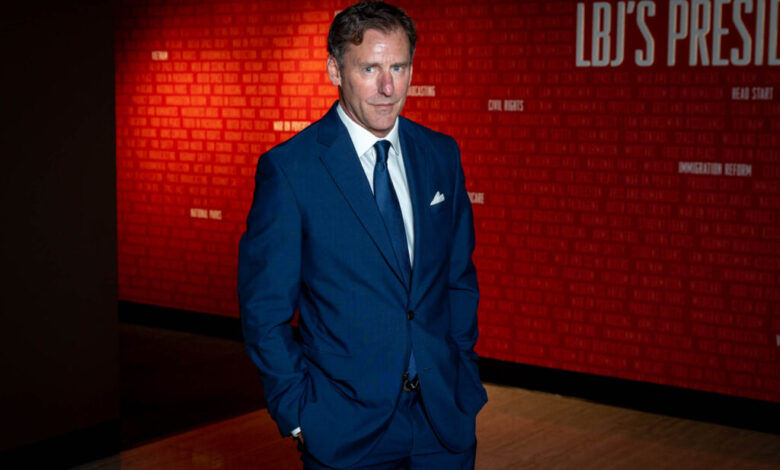Leaders, writers and thinkers tackle in-depth conversations ‘Live from the LBJ Library’

“Live from the LBJ Library” is a series of conversations between leaders and decision-makers and historian Mark Updegrove about democracy and how to preserve and strengthen it. Updegrove, the former director of the LBJ Library and Museum, currently serves as president and CEO of the LBJ Foundation.
He joined the Standard to share more about the series’ second season. Listen to the interview above or read the transcript below.
This transcript has been edited lightly for clarity:
Texas Standard: I was telling you a little bit earlier how much I have enjoyed this series. Congratulations on the second season. Say a little more to us about how the idea of this program came to be in the first place.
Mark Updegrove: As you mentioned, I was both the director of the LBJ Library and I’m now the CEO of the LBJ Foundation. And in both roles, I’ve been able to put on the public programming that is a signature of the LBJ library and has been since its inception in 1971. So we’ve always done really great public programming to an audience of a thousand who fills the auditorium.
But we thought there’s an opportunity to take that to a larger audience at a time when I think long-form thoughtful conversations may be appreciated. We live in an age where you have these quick bites, but not long, comprehensive, more thoughtful conversations.
We wanted to bring that to a national audience. At the root of this is how do we better understand this very difficult moment we’re in as a nation and the state of democracy in our country today?
Let’s talk a little bit more about the state of democracy today. I’m wondering how you go about thinking of this conversation about the state of democracy when it seems now, more than perhaps at any time in our history, we struggle over having a shared language about what American democracy means.
Yeah, the very fact that that word has become a lightning rod in a way, that in itself is a stunning thing. That’s not something I ever thought would happen in the course of my lifetime, but you’re right. You have extremism on both sides. And we’re doing this conversation, of course, after the assassination of Charlie Kirk. We’re seeing the extremism.
President Trump talked about the radical left. There may be a radical left, but there’s also a radical right. There’s just radicalism that is part – a natural part of political discourse in our country.
And I’m hopeful that these conversations can bring us all perhaps more toward the middle and get us to understand that this heated rhetoric is getting us nowhere as a nation. It’s just creating greater divisions among us. These conversations are sober. And I hope we’ll get us, as LBJ used to say, “come and reason together.”
» GET MORE NEWS FROM AROUND THE STATE: Sign up for Texas Standard’s weekly newsletters
I have to ask you – and this is one of those questions that whenever someone asks me about it, they say, “who’s your favorite person you’ve ever interviewed?” And I’m always flat-footed.
So what about you? Do you have a favorite interview so far in this series?
You know, I don’t; there are great moments. We mentioned this in terms of democracy – I should mention that it’s not just about democracy.
We had Bryan Cranston. He talked about “Breaking Bad” and what “Breaking Bad” said about America, how that plays into the American story and why he decided to play LBJ. It just so happened he played LBJ.
We talked to Andrew Young about the civil rights movement. We talk to Heather Cox Richardson, specifically, as you suggest, about the state of democracy.
I think there are great moments, but it’s like naming a favorite child. These conversations mean something. They grow organically, and it’s difficult to name one favorite.
My hope is that you might tune in for a big name, like a Heather Cox Richardson or a Bryan Cranston or Woodward and Bernstein, but that you will stay for folks you may not know but who have these really interesting points of view that we should be exposed to.
I feel like I’m a Texas partisan with my role at the Texas Standard. It’s wonderful to see a well-known author and someone who’s become such a powerful figure in Texas letters, Lawrence Wright, appear.
And you think about how these shows are being broadcast across the nation and in a way bringing a lot of perspective that I think folks don’t have about Texas and people who are making noise here.
You know, the interviews are 26 minutes. I was at minute 25, and I thought, “well, this has got to be a two-parter.” Same with Doris Kearns Goodwin.
Because what [Wright] was talking about was the situation in the Middle East. He’s just written a novel about the Middle East and the nuances that we don’t appreciate about what’s happening in the Middle East, in Israel, in Gaza, in the broader Middle Eastern region.
And boy, if your audience can tune into that alone, I think they will get a far greater perspective, a more nuanced perspective, which we all often lack when we look at our foreign policy on the Middle East.
Source link


